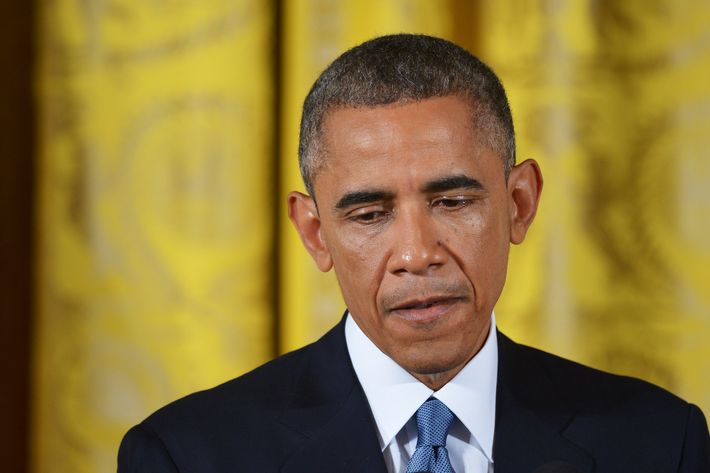
Earlier this week, the Daily Caller found videos of economist Jonathan Gruber, who helped write the Affordable Care Act, committing gaffes. Conservatives have responded with wild anger at what they take to be a confession that the hated law was designed to fool the public. Gruber “said that lack of transparency was a major part of getting ObamaCare passed, and that it was written in such a way as to take advantage of ‘the stupidity of the American voter,’” cries Fox News. The right-wing media is treating Gruber’s comments as a “scandal” and even proposing possible hearings in Congress. The furor over Gruber’s comments is based mostly on a simple misunderstanding, but there is enough truth in conservative claims about what he said to draw the mainstream media into the outrage.
Here is what Gruber said. Unlike some other transcripts, I am leaving in his stammering, because it helps clarify the context of his meaning:
This bill was written in a tortured way to make sure the CBO [Congressional Budget Office] did not score the mandate as taxes. If CBO scored the mandate as taxes, the bill dies. So it’s written to do that.
In terms of risk-rated subsidies, in a law that said health people are gonna pay in — if it made explicit that healthy people are gonna pay in, sick people get money, it would not have passed. Okay — just like the … people — transperen— lack of transparency is a huge political advantage. And basically, call it the stupidity of the American voter or whatever, but basically that was really, really critical to get anything to pass.
Let’s unpack what Gruber is saying here.
1. The individual mandate. Obamacare has a requirement for individuals to purchase health insurance, so that they cannot ride free by waiting until they get sick to buy a plan. There is a metaphysical debate about whether it constitutes a tax. As Gruber says, the outcome of that debate carried massive political import. The administration framed the mandate as a requirement backed by a fine, like a parking regulation, as opposed to a broad-based revenue mechanism, like the income tax. Mitt Romney, when describing the individual mandate he imposed in Massachusetts, likewise denied that it was a tax. (“The plan did an extraordinary job of covering nearly half a million people who were previously uninsured without raising taxes.”)
Gruber is merely pointing out that supporters of the law took pains to design its mandate so that the Congressional Budget Office would not define it as a tax. At worst, this was spin. At best, this a perfectly accurate way to sell the individual mandate — as a fine on free-riding behavior, like parking without feeding the meter, as opposed to a levy designed mainly for revenue.
2. The stupidity of the American voter. Here is where Gruber’s comment most rankles. “Stupidity” is unfair. Ignorance is a more accurate term. Very few people understand economics and public policy. This is especially true of Obamacare — most Americans are unaware of the law’s basic functions or even whether their state is participating.
Since people know so little about public policy in general and health-care policy in particular, they tend to have incoherent views. In health care and other areas, they want to enjoy generous benefits while paying low taxes and don’t know enough details to reconcile those irreconcilable preferences. Gruber’s error here is that, by describing this as “stupidity” rather than a “lack of knowledge,” he moves from lamenting an unfortunate problem both parties must work around to condescending to the public in an unattractive way.

3. Transfers from the healthy to the sick. Here you need to back up and understand that people lack health insurance for two basic reasons: They’re poor or they’re sick. Poor people were subsidized through tax credits, which were financed through a combination of spending cuts and tax hikes. Sick people were subsidized in a more indirect way, and that is what Gruber is describing here.
The subsidy for sick people involved preventing insurance companies from charging higher prices to customers with a preexisting condition. (This is not a controversial idea. Employer-based insurance does this. Medicare does it. People, even healthy ones, like those plans.) This is an extremely popular idea, in part because, as Gruber points out, the costs are hidden — it forces insurance companies to charge higher rates to healthier people so that they can offer lower rates to sick ones.
What Gruber is saying here is that Obamacare finances the subsidies that make insurance available to sick people whose premiums would otherwise be exorbitant by regulation, rather than through straightforward taxes. If you are a relatively healthy person who gets insurance through your job, you are subsidizing your sicker co-workers in just the same, hidden way.
Indeed, the system where sick people can’t be charged too much is so popular that Republicans usually promise that they, too, will include such a feature in their as-yet-unwritten health-care plans. But they almost never say where the money to finance this will come from. Republicans believe that forcing young, healthy customers to pay more is a massive injustice, which would rule out that mechanism. Mitt Romney got around this problem by promising affordable coverage to people with preexisting conditions but failed to mention that this would be available only to those who maintained continuous coverage, a right that already exists (indeed, it has existed since 1996, and renders the guarantee useless to the vast majority of people who need coverage.) Others promise to create high-risk pools where sick people can buy affordable coverage. These would only work well if heavily subsidized, a problem Republicans solve by ignoring it completely.

4. “Lack of transparency is a huge political advantage.” Here is where media reports have most badly bungled Gruber’s point. They have treated his line about transparency as if he were describing the entire process of writing and passing the law. Media coverage has compounded the misimpression by cutting out the stammering in his remarks about transparency, treating each of them as a stand-alone thought. Even MSNBC played an edited version that began Gruber’s remarks with “Lack of transparency is a huge political advantage …”
But Gruber was not talking about passing the law in a non-transparent fashion. Conservatives believe the law was passed non-transparently, but nobody who supported it considers this anything but a bizarre description of one of the most drawn-out public and legislative debates in the history of Congress. Gruber was surely referring to the non-transparent mechanism of regulating insurance companies, causing them to charge less to the sick and more to the healthy, without Congress having to carry out those transfers through direct taxes.
Gruber is right about this, too. Suppose Congress had decided not to regulate insurers but instead charged higher taxes to healthy people, and wrote checks directly to sick people. People would have hated it, even though the popular mechanism Congress used instead does the very same thing.
The Washington Post reports that Gruber was caught admitting Obamacare “was crafted in a deliberately deceptive way in order to pass Congress.” That is not what Gruber said in the video. He was trying to explain how the law’s architects had to compromise the simple technocratic purity they might use to design the law in an academic setting to account for an irrational political system in which tiny bits of fact can be decontextualized and manipulated by demagogues. The reaction to Gruber’s comments this week is fitting punishment for his obnoxious phrasing, but only serves to vindicate his underlying beliefs.






























